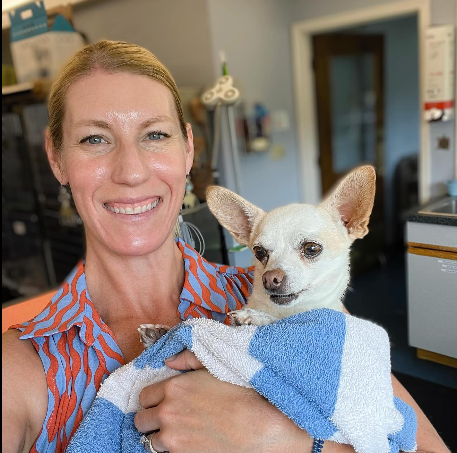Cavalier King Charles Spaniels are a popular dog breed known for their sweet, gentle temperament. Unfortunately, they are also prone to certain health issues, particularly mitral valve disease leading to heart failure. In this article we talk about Cavalier King Charles Spaniel Heart Disease-Mitral Valve Disease, including the causes, symptoms, diagnosis, treatment options, and things you can do at home to support your dog.
Table of Contents
What is Mitral Valve Disease?
The mitral valve is located between the left atrium and left ventricle of the heart. It has two flaps (leaflets) that open and close with each heartbeat to allow blood to flow from the atrium into the ventricle, while preventing backflow of blood. Mitral valve disease (also known as mitral valve insufficiency or mitral valve regurgitation) occurs when the valve leaflets do not seal properly, allowing blood to leak back into the atrium. This reduces the efficiency and performance of the heart.
Over time, the chronic volume overload caused by the leaky valve results in stretching and enlargement of the left atrium and ventricle. The heart must work harder to pump sufficient blood to the body. Eventually, congestive heart failure develops when the heart is unable to compensate any further.
What Causes Mitral Valve Disease in Cavaliers?
In most dogs, mitral valve disease occurs when the valve leaflets degenerate or the tendon chords that support them stretch and weaken. This causes the leaflets to billow back into the atrium during ventricular contraction.
However, Cavalier King Charles Spaniels have a hereditary form of mitral valve disease. Abnormal development of the mitral valve early in life predisposes them to early onset valve thickening, improper closure, and subsequent leakage. Genetic studies suggest that mitral valve disease in Cavaliers is polygenic, meaning multiple genes are involved.
Due to this genetic factor, over 50% of Cavalier King Charles Spaniels will have a heart murmur caused by mitral regurgitation by age 5. By age 10, that statistic increases to over 90% being affected.
Symptoms of Mitral Valve Disease
Mitral valve disease typically progresses slowly over years. In the early stages, dogs may show no outward symptoms. The first sign is usually the detection of a heart murmur during a wellness exam. As mitral valve regurgitation advances, common symptoms include:
- Coughing
- Fatigue, reduced exercise tolerance
- Heavy or rapid breathing
- Weight loss
- Abdominal swelling due to fluid accumulation
- Fainting or collapse
Veterinary Diagnosis
If a heart murmur is heard, further diagnostic tests will be recommended to evaluate its cause and severity. These may include:
- Chest x-rays – allows assessment of heart size and shape; looks for pulmonary edema (fluid buildup in lungs)
- ECG – evaluates electrical conduction through the heart
- Echocardiogram – ultrasound of the heart to visually examine valves, chamber size, pumping function, and blood flow
- Blood tests – check organ function and look for secondary issues like anemia
Your vet will grade the severity of the murmur on a scale of I to VI, with VI being the loutest. They will also stage mitral valve disease from A to D, with D being congestive heart failure. These classifications help guide treatment recommendations and prognosis.
Medical Treatment Options
The goals of treating mitral valve disease are to relieve clinical signs, slow further progression, prevent congestive heart failure, and improve quality of life.
Common medications veterinarians prescribe include:
- ACE inhibitors – dilate blood vessels to decrease workload on the heart
- Diuretics – remove excess fluid accumulation in lungs or abdomen
- Positive inotropes – strengthen heart muscle contraction
- Antiarrhythmics – help stabilize irregular heart rhythms
- Blood thinners – prevent blood clot formation
- Supplemental oxygen – improves exercise tolerance
The type and combination of medications will depend on the individual patient’s disease stage and symptoms. Most dogs respond very well to tailored medical protocols and can enjoy many good years post-diagnosis.
In severe refractory cases, surgical repair of the mitral valve may be considered. However, this invasive procedure is rarely performed due to the risks involved.
Caring for Your Cavalier at Home
If your Cavalier King Charles Spaniel is diagnosed with a heart murmur or mitral valve disease, there are several things you can do at home to keep them comfortable:
- Administer all medications as prescribed
- Restrict exercise; avoid overexertion
- Prevent obesity to reduce cardiac workload
- Feed a high quality diet for heart health
- Monitor breathing rate and effort
- Learn to take a heart rate and pulse
- Keep up with recommended veterinary rechecks
- Create a safe, low-stress environment
- Shower your pup with love and affection!
While mitral valve disease cannot be cured, it can often be very successfully managed for many years. Working closely with your veterinarian and providing excellent supportive care at home will give your Cavalier the best quality of life possible. With a proactive approach, dogs with mitral valve disease can still lead happy, fulfilling lives alongside their loving owners.

Dr. Allison Kramer is a seasoned veterinarian with a Master’s degree in Animal Behavior and over 10 years of experience specializing in canine health and behavior. Her expertise in positive reinforcement training and holistic care enhances the well-being of dogs and fosters strong pet-owner relationships. For expert advice and valuable insights, follow Dr. Kramer on Instagram @dr.allisonkramer.





